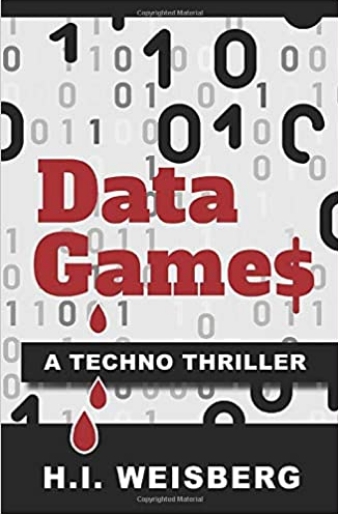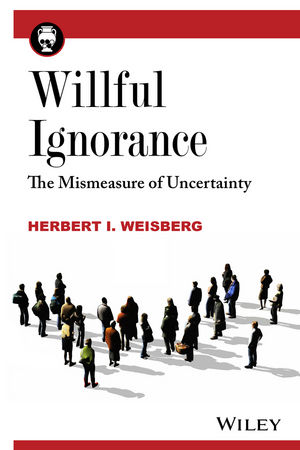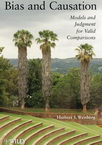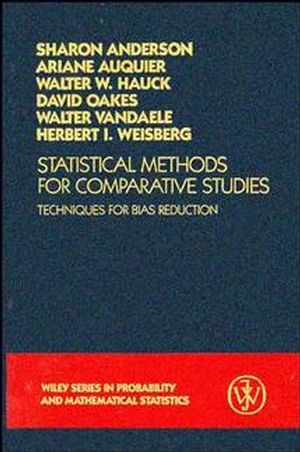DATA GAMES
(Fiction): When a drug company’s blockbuster anti-cancer drug is discredited in a new clinical study, statistics professor Ken Wheeler is hired to investigate. If the study’s results are upheld by the FDA, millions of cancer patients could potentially be deprived of life-saving treatment. The new research appears to be flawless, but as he delves into the data, Ken’s suspicions grow. Soon, he confronts the chilling reality that powerful forces want to prevent a secret hidden in the data from being exposed. Ken must draw on more than math to discover the truth, and live to reveal it, before time runs out.
[The book grabs you in the first chapter and doesn't let go! A must-read for statisticians. A great gift to your friends (spouse) who wonder what statisticians do. — Milo Schield]
Interview (Significance magazine: August 2020):
“It seems to me that the profile of statisticians remains rather low, and what we contribute is often misunderstood and underestimated by others.”
“For me, statistical modelling and analysis is all about solving complex puzzles in a real-world context where the solutions really matter. So I wanted to convey the sense of excitement that often entails, exaggerated just a bit for dramatic effect, of course.”
“As my fictional hero mentions, our entire system of medical research is predicated on trust in the numbers. Regrettably, we live in a moment when many people lack trust in science generally, and statistics in particular.”
Biography
Herb I. Weisberg (1944– ) was born in New York City and raised in White Plains, NY. He graduated from Columbia University and received his doctorate in statistics from Harvard. After a brief stint in academia, he has spent the bulk of his career as a statistical consultant.
Herbert I. Weisberg, PhD, is the president of Causalytics, LLC, which develops innovative technology for predictive analytics for both medical research and business applications. He is the founder of Correlation Research Inc., a consulting firm specializing in the application of statistics to various business and legal issues. A Fellow of the American Statistical Association, Dr. Weisberg has published numerous articles and two previous books related to applied statistics.
ARTICLES by Herbert I. Weisberg:
- Herbert I. Weisberg (2011). Statistics and clinical trials: past, present and future. Proceedings of the American Statistical Association.
- Herbert I. Weisberg (1974). Short Term Cognitive Effects of Head Start Programs: A Report on the Third Year of Planned Variation—1971–72. U. S. Department of Health, Education and Welfare.
- Herbert I. Weisberg (1972). Upper and lower probability inferences from ordered multinomial data. Journal of the American Statistical Association, 67: 884–890.
Willful Ignorance: The Mismeasure of Uncertainty Amazon © 2014 John Wiley & Sons, Inc.
An original account of willful ignorance and how this principle relates to modern probability and statistical methods.
Through a series of colorful stories about great thinkers and the problems they chose to solve, the author traces the historical evolution of probability and explains how statistical methods have helped to propel scientific research. However, the past success of statistics has depended on vast, deliberate simplifications amounting to willful ignorance, and this very success now threatens future advances in medicine, the social sciences, and other fields. Limitations of existing methods result in frequent reversals of scientific findings and recommendations, to the consternation of both scientists and the lay public.
Willful Ignorance: The Mismeasure of Uncertainty exposes the fallacy of regarding probability as the full measure of our uncertainty. The book explains how statistical methodology, though enormously productive and influential over the past century, is approaching a crisis. The deep and troubling divide between qualitative and quantitative modes of research, and between research and practice, are reflections of this underlying problem. The author outlines a path toward the re-engineering of data analysis to help close these gaps and accelerate scientific discovery.
Willful Ignorance: The Mismeasure of Uncertainty presents essential information and novel ideas that should be of interest to anyone concerned about the future of scientific research. The book is especially pertinent for professionals in statistics and related fields, including practicing and research clinicians, biomedical and social science researchers, business leaders, and policy-makers.
Table of Contents:
- The Opposite of Certainty
- A Quiet Revolution
- A Matter of Chance
- Hardly Touched Upon
- A Mathematician of Basel
- A Defect of Character
- Classical Probability
- Babel
- Probability and Reality
- The Decision Factory
- The Lottery in Science
- Trust, but Verify
Bias and Causation: Models and Judgment for Valid Comparisons 2010 Hoboken, NJ: John Wiley & Sons, Inc., 308 pg.
Ch 1.1: “Bias is intrinsically a problem related to causality. We explain how traditional statistical methods are severely limited as a way to address causality in general, and questions related to bias in particular. Consequently, a new approach to data analysis is needed. Subsequent chapters describe a theoretical framework within which such a 'new paradigm' has begun to evolve.”
Ch 1.2: “Throughout this book, the term bias will mean the extent to which a particular measure of a causal effect has been systematically distorted. Forms of bias that fall under this umbrella derive from shortcomings of research design, implementation and analysis, and they can thus be considered methodological biases.
“Discussions of bias are sometimes confusing because this term also has several other connotations. To a mathematical statistician, bias is a technical property of an estimate. An estimate of some parameter, such as the mean of a given population, is biased if the estimate 'on average' deviates from the true value of the parameter. To a social scientist, bias may pertain to aspects of human behavior or psychology. Do certain individuals or groups tend to think or act in a predetermined manner in a specified situation? In addition, bias may suggest a negative or prejudicial attitude toward a particular group or ideology. As used throughout this book, bias is only incidentally related to any of these other interpretations.
“Because they result from systematic and not random distortion, methodological biases are generally not amenable to correction by mathematical formulas. An understanding of potential biases in practice requires not only quantitative sophistication, but also a solid grounding in the relevant scientific context. The topic of bias resides in a kind of non-man's-land between the discipline of statistics and the various scientific fields in which research takes place. This orphan status may help to explain why a comprehensive theory of bias has yet to emerge.”
Table of Contents:
- What is Bias?
- Causality and Comparative Studies
- Estimating Causal Effects
- Varieties of Bias
- Selection Bias
- Confounding: An Enigma?
- Confounding: Essence, Correction and Detection
- Intermediate Causal Factors
- Information Bias
- Sources of Bias
- Contending with Bias
Back Cover
A one-of-a-kind resource on identifying and dealing with bias in statistical research on causal effects
Do cell phones cause cancer? Can a new curriculum increase student achievement? Determining what the real causes of such problems are, and how powerful their effects may be, are central issues in research across various fields of study. Some researchers are highly skeptical of drawing causal conclusions except in tightly controlled randomized experiments, while others discount the threats posed by different sources of bias, even in less rigorous observational studies. Bias and Causation presents a complete treatment of the subject, organizing and clarifying the diverse types of biases into a conceptual framework. The book treats various sources of bias in comparative studies—both randomized and observational—and offers guidance on how they should be addressed by researchers.
Utilizing a relatively simple mathematical approach, the author develops a theory of bias that outlines the essential nature of the problem and identifies the various sources of bias that are encountered in modern research. The book begins with an introduction to the study of causal inference and the related concepts and terminology. Next, an overview is provided of the methodological issues at the core of the difficulties posed by bias. Subsequent chapters explain the concepts of selection bias, confounding, intermediate causal factors, and information bias along with the distortion of a causal effect that can result when the exposure and/or the outcome is measured with error. The book concludes with a new classification of twenty general sources of bias and practical advice on how mathematical modeling and expert judgment can be combined to achieve the most credible causal conclusions.
Throughout the book, examples from the fields of medicine, public policy, and education are incorporated into the presentation of various topics. In addition, six detailed case studies illustrate concrete examples of the significance of biases in everyday research.
Requiring only a basic understanding of statistics and probability theory, Bias and Causation is an excellent supplement for courses on research methods and applied statistics at the upper-undergraduate and graduate level. It is also a valuable reference for practicing researchers and methodologists in various fields of study who work with statistical data.
Reviews
“The book combines a useful synthesis of the literature with an original working through of issues related to bias and causal inference. Anyone with a sustained interest in this topic will find the book worth reading.” (Journal of Educational and Behavioral Statistics, May 2012)
“...the book provides a unified framework for understanding issues of causal inference discussed differently across disciplines...the book will also be of substantial interest to methodologically minded readers working within specific disciplines but interested in methodological literature from other disciplines.” (Journal of Educational and Behavioral Statistics, May 2012)
“The book covers almost all the relevant biases that can be present when designing and analyzing treatment effects in comparative studies.” (Journal of Biopharmaceutical Statistics, January 2011)
“A consultant who specializes in applying statistics to various business and legal issues, Weisberg explains approaches to bias and causal inference, a realm statisticians have avoided until recently because it requires intuitive skills beyond the pale of mathematics. He writes for practicing researchers and methodologists and for students with a reasonably solid grounding in basic statistics and research methods.” (SciTech Book News, December 2010)
Extract by Milo Schield
Throughout this book, the term bias will mean the extent to which a particular measure of a causal effect has been systematically distorted. Forms of bias that fall under this umbrella derive from shortcomings of research design, implementation and analysis, and they can thus be considered methodological biases.
Discussions of bias are sometimes confusing because this term also has several other connotations. To a mathematical statistician, bias is a technical property of an estimate. An estimate of some parameter, such as the mean of a given population, is biased if the estimate 'on average' deviates from the true value of the parameter. To a social scientist, bias may pertain to aspects of human behavior or psychology. Do certain individuals or groups tend to think or act in a predetermined manner in a specified situation? In addition, bias may suggest a negative or prejudicial attitude toward a particular group or ideology.
As used throughout this book, bias is only incidentally related to any of these other interpretations.
Because they result from systematic and not random distortion, methodological biases are generally not amenable to correction by mathematical formulas. An understanding of potential biases in practice requires not only quantitative sophistication, but also a solid grounding in the relevant scientific context. The topic of bias resides in a kind of non-man's-land between the discipline of statistics and the various scientific fields in which research takes place. This orphan status may help to explain why a comprehensive theory of bias has yet to emerge.
Statistical Methods for Comparative Studies (1980) E-book 2009.
Sharon Roe Anderson, Ariane Auquier, Walter W. Hauck, David Oakes, Walter Vandaele, Herbert I. Weisberg. Wiley
Brings together techniques for the design and analysis of comparative studies. Methods include multivariate matching, standardization and stratification, analysis of covariance, logit analysis, and log linear analysis. Quantitatively assesses techniques' effectiveness in reducing bias. Discusses hypothesis testing, survival analysis, repeated measure design, and causal inference from comparative studies.
Table of Contents:
- Introduction.
- Confounding Factors.
- Expressing the Treatment Effect.
- Randomized and Nonrandomized Studies.
- Some General Considerations in Controlling Bias.
- Matching.
- Standardization and Stratification.
- Analysis of Covariance.
- Logit Analysis.
- Log-Linear Analysis.
- Survival Analysis.
- Analyzing Data From Premeasure/Postmeasure Designs.
- Choice of Procedure.
- Considerations in Assessing.
- Association and Causality.





